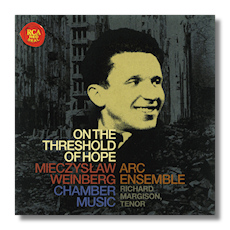
The Internet's Premier Classical Music Source
Related Links
- Latest Reviews
- More Reviews
-
By Composer
-
Collections
DVD & Blu-ray
Books
Concert Reviews
Articles/Interviews
Software
Audio
Search Amazon
Recommended Links
Site News
 CD Review
CD Review
Mieczysław Weinberg

On The Threshold Of Hope
- Jewish Songs after Shmuel Halkin, Op. 17
- Quintet for Piano and Strings, Op. 18
- Sonata for Clarinet and Piano, Op. 28
Richard Margison, tenor
ARC Ensemble
RCA Red Seal 82876-87769-2 DDD 76:56
Here's a composer who might be on the verge of receiving the recognition he deserves. Chandos is in the middle of a (slowly progressing!) Weinberg symphony cycle, and now here's a release of three major chamber works composed in 1944 or 1945. The composer's Jewish faith, and the dates of the music's composition, have suggested this CD's title, which is "On the Threshold of Hope." Holocaust-related imagery and allusions to anti-Semitism pervade the booklet, probably in hopes of piquing the potential listener's interest, but Weinberg never spent time in a Nazi concentration camp. In fact, he left Warsaw in 1939 and, instead of escaping to the West, he went east to Minsk, and then continued on to Tashkent after the Germans invaded the Soviet Union. After the war, Weinberg remained in the Soviet Union and encountered its own brand of anti-Semitism. This, then, is really not "Holocaust music," as some might be led to believe, even though Weinberg's family was killed by the Nazis. Weinberg's work is of a very high stature and really should not need extra-musical associations to attract new listeners. Goodness knows there's already been enough confusion concerning alternative (and incorrect) spellings of his name as, for example, "Moysey Vainberg."
Weinberg (1919-1996) met Shostakovich during the war years. Shostakovich apparently liked Weinberg's music, and a warm relationship between the two composers persisted until Shostakovich's death. Anyone who likes Shostakovich's music probably will like Weinberg's as well. (It also should be noted that Shostakovich, while not a Jew himself, was sympathetic, and daringly included Jewish themes in several of his major works.)
All three works on this CD are both approachable and artistically important; this is not a "niche" release by any means. The three-movement Clarinet Sonata certainly should be a staple of that instrument's repertoire, not just for the suggestions of klezmer music in the second movement, but also for the entire sonata's ambitious construction and for the worthwhile challenge it poses to the soloist. The song-cycle is a setting of six Yiddish poems by Shmuel Halkin. Although the texts celebrate the Soviet war effort – the soldiers and those remaining at home – this is hardly a glorification of war, or mere jingoism. Weinberg achieved something here that Shostakovich never was able to achieve, in my opinion: nationalistic music of a high quality without a trace of irony. The third work on this CD is a Piano Quintet from 1944. This is a work in five movements, in which the second and third are fast and increasingly grotesque, and the fourth a frozen Largo that is almost twice as long as the next longest movement. (Similarities to Shostakovich again!) The Quintet begins with a memorable theme, and Weinberg cannily brings it back at the end of the work. The driving final movement also contains episodes strongly reminiscent of a Highland fling, but that surely must be a coincidence!
The ARC Ensemble is comprised of faculty members from the Royal Conservatory of Music in Toronto. On this CD, we hear clarinetist Joaquín Valdepeñas, violinists Erika Raum and Marie Bérard, violist Steven Dann, cellist Bryan Epperson, and pianists Dianne Werner and David Louie. All the performances are first-class in the sense that I don't see how they could be improved upon. Canadian tenor Richard Margison lends his handsome voice and interpretive commitment to the Halkin songs. The performances are complemented by excellent engineering.
The major classical labels are playing it very safe these days, and I would not have expected a CD such as this one to appear on RCA Red Seal. Please show Sony BMG Masterworks that this is the kind of CD you want them to release more of by buying "On the Threshold of Hope."
Copyright © 2007, Raymond Tuttle




















